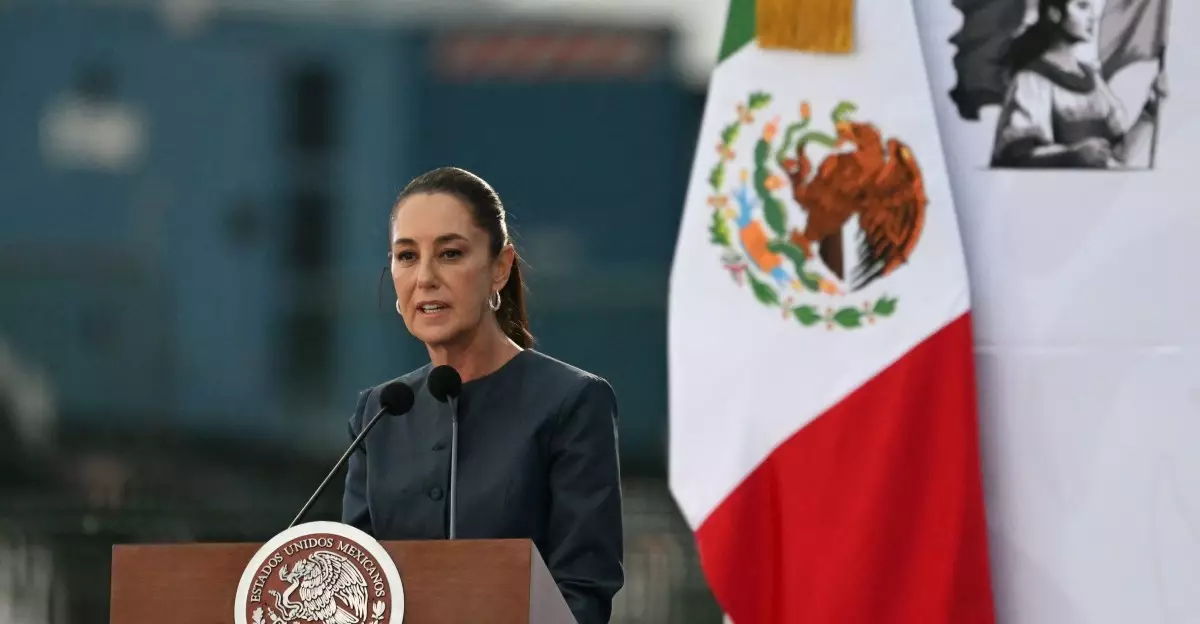The recent announcement by Mexican President Claudia Sheinbaum highlights a contentious issue that straddles cultural, legal, and technological boundaries. At the core of this conflict is the Trump administration’s attempt to rename the Gulf of Mexico to “Gulf of America.” While the renaming may seem trivial to some, it encapsulates deeper sentiments concerning national identity and respect for sovereign territories. Trump’s decree was not just a matter of semantics; it signaled a broader cultural agenda that sought to assert American dominance in even the most innocuous of arenas, like cartography.
Claudia Sheinbaum’s swift legal actions against Google for complying with this name change reveal that the Mexican government is taking this matter seriously. The lawsuit symbolizes a unified stand against perceived imperialism, showcasing that names hold power, history, and identity. Sheinbaum’s remarks during her press briefing underscore a fundamental principle: the delineation of territory comes with the understanding that each part belongs to its respective nation, and thus should be represented accurately. The fact that parts of the Gulf belong to Mexico, the U.S., and even Cuba complicates the narrative, but Sheinbaum argues vehemently for its recognition.
Corporate Influence and Sovereignty
One of the more troubling aspects of this situation is the complicity of corporate entities in enforcing political narratives. Google and other tech companies have displayed a willingness to adapt to governmental directives that do not necessarily honor the international landscape. By yielding to the Trump administration’s mandate, these corporations inadvertently contribute to the erasure of local identities. Sheinbaum’s lawsuit aims to challenge this complicity, making it clear that corporations can’t just play by the rules set by a particular nation, but must acknowledge the global nature of names and territories.
In an era where information is largely mediated by technology, our understanding of geographical and political realities can be distorted by intentional or negligent drone mapping techniques. Sheinbaum is not merely contesting a name; she is defending how Mexico is positioned in a global context. This is crucial not only for national pride but also for academic and historical accuracy. The implications here extend to how future generations will understand territorial identities—and that matters significantly.
The Ripple Effect of Political Decisions
The political implications of such a name change are far-reaching. Just as President Trump sought to redefine the narrative through a mere geographical label, other nations might feel emboldened to make similar claims about territories based on arbitrary rulings. This raises serious questions about the integrity of political borders and names, potentially leading to widespread disputes. The ongoing struggle between the U.S. and Mexico over identity and territory echoes a broader conversation about how globalization influences traditional boundaries.
As Sheinbaum pursues legal remedies, she highlights a pressing need for international adherence to agreed-upon names, as dictated by cartographic standards rather than political whim. The fact that the U.S. House of Representatives passed a bill codifying the name change only intensifies the urgency of Sheinbaum’s actions. This brings the issue out of the realm of mere opinions into a legal battlefield where future norms regarding cartographic representation will be established.
The Importance of Cultural Heritage
From a cultural perspective, Sheinbaum’s insistence on preserving the name “Gulf of Mexico” reflects a deep commitment to heritage. Names are not only identifiers; they evince a collective memory, culture, and the very essence of a marine environment that has shaped the lives of communities for centuries. When we allow geographical entities to be renamed on a whim, we undermine the complex histories tied to these places. Sheinbaum’s actions can be seen as a protective measure against cultural appropriation.
Moreover, the response from companies like Google could set a precedent for how tech corporations engage with state and national responsibilities. Beyond simply navigating commercial landscapes, companies need to consider their role in ethical representation. Rigid compliance with government requests that compromise local identities can have damning consequences for businesses, impacting public perception and customer loyalty in increasingly globalized markets.
As this legal battle unfolds, it embodies a much larger struggle concerning identity politics, corporate ethics, and the integrity of geographical representation. The outcome could redefine not only how Mexico is perceived internationally but also how tech giants approach the sensitive interplay between politics, culture, and cartographic accuracy.

